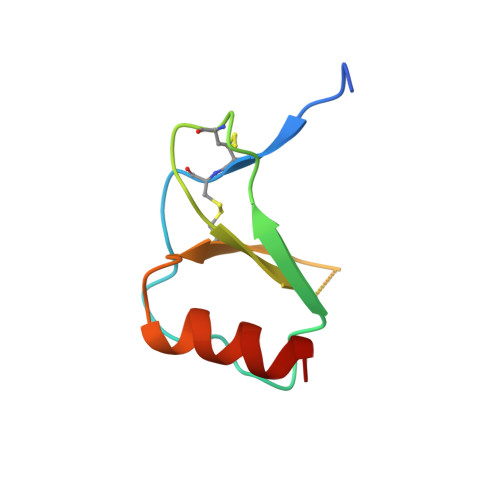The X-ray structure of RANTES: heparin-derived disaccharides allows the rational design of chemokine inhibitors.
Shaw, J.P., Johnson, Z., Borlat, F., Zwahlen, C., Kungl, A., Roulin, K., Harrenga, A., Wells, T.N., Proudfoot, A.E.(2004) Structure 12: 2081-2093
- PubMed: 15530372
- DOI: https://doi.org/10.1016/j.str.2004.08.014
- Primary Citation of Related Structures:
1U4L, 1U4M, 1U4P, 1U4R - PubMed Abstract:
The biological activity of chemokines requires interactions with cell surface proteoglycans. We have determined the structure of the chemokine RANTES (regulated on activation normal T cell expressed) in the presence of heparin-derived disaccharide analogs by X-ray crystallography. These structures confirm the essential role of the BBXB motif in the interaction between the chemokine and the disaccharide. Unexpected interactions were observed in the 30s loop and at the amino terminus. Mutant RANTES molecules were designed to abrogate these interactions and their biological activity examined in vivo. The K45E mutant within the BBXB motif lost the capacity to bind heparin and the ability to elicit cellular recruitment. The Y3A mutant maintained its capacity to bind heparin but was unable to elicit cellular recruitment. Finally, a tetrasaccharide is the smallest oligosaccharide which effectively abolishes the ability of RANTES to recruit cells in vivo. These crystallographic structures provide a description of the molecular interaction of a chemokine with glycosaminoglycans.
Organizational Affiliation:
Serono Pharmaceutical Research Institute, 14 Chemin des Aulx, 1228 Plan-les-Ouates, Geneva, Switzerland. jeffrey.shaw@serono.com















